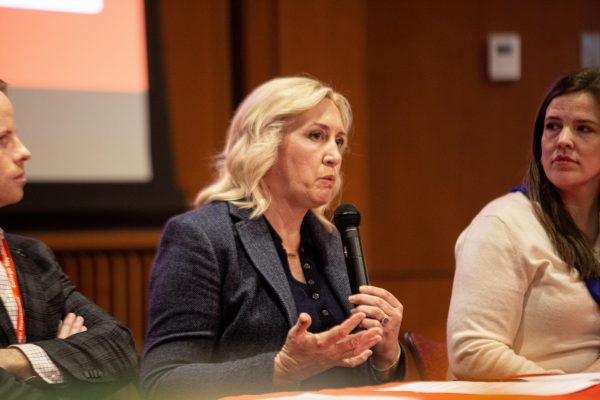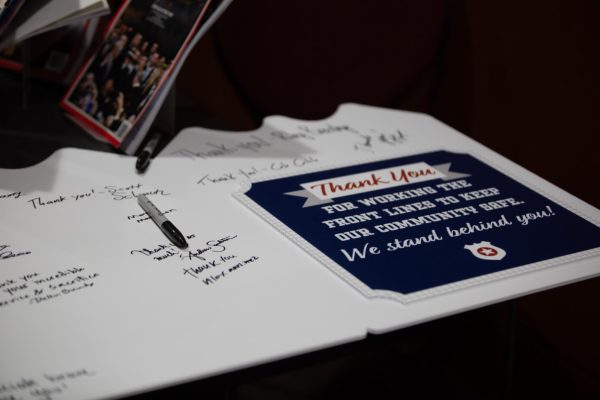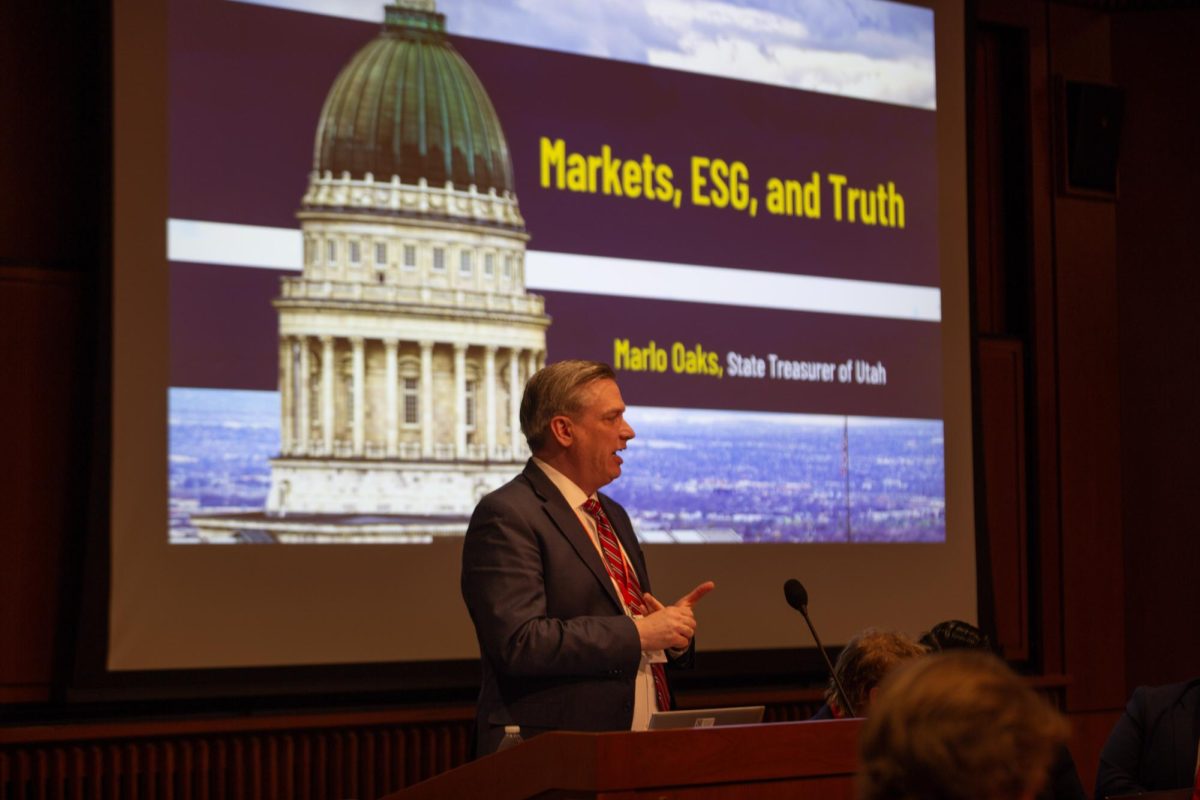The 2025 College Republican Convention took place Saturday, March 22, at the Gould Auditorium in the Marriott Library. Hosted by the Utah Federation of College Republicans, the event brought together chapters from the University of Utah, Brigham Young University, Weber State University and Utah State University for a day of discussions, speeches and resolutions.
Seventy-six students attended in hopes of engaging directly with Utah’s Republican leaders, asking questions about policy decisions and voicing their frustrations with the government.
Keynote speakers included Rep. Mike Kennedy, from Utah’s 3rd Congressional District, Rep. Burgess Owens, from Utah’s 4th Congressional District, State Auditor Tina Cannon and Attorney General Derek Brown (who joined via Zoom), among others. Topics ranged from federal spending and bureaucracy to Social Security, healthcare, veterans’ rights, diversity initiatives and environmental policy.
Focus on Fiscal Responsibility and Government Spending
A central theme of the convention was cutting government waste. Many speakers supported spending reductions through the Department of Government Efficiency, or DOGE, a financial initiative associated with Elon Musk.
Owens emphasized the need for fiscal responsibility.
“Let’s not bow to the socialist idea that centralized government, this great religious group, knows more about how to live our lives than we do,” Owens said. “Just bring the money back to us, which is what’s happening right now. Cut all the waste, cut all the fraud, all of theft, and then we can truly have a good return investment.”
Justin Anthony, chief of staff for Utah Sen. Mike Lee, echoed similar concerns. He advocated for the REINS Act, which would require congressional approval for federal regulations with economic impacts exceeding $100 million.
“Next to that stack of bills passed by Congress, roughly three feet high, there are three bookcases, totaling about 13 feet tall. Those are all the rules and regulations passed by unelected, unaccountable bureaucrats in the last year,” Anthony said. “We don’t even know who they are, yet we’re required to follow their regulations just as we follow laws passed by Congress.”

The Future of Social Security and Energy Policy
Students also raised concerns about the sustainability of Social Security, Medicare and Medicaid in light of spending cuts. Kennedy, who has a background in medicine, suggested that Medicaid reform is needed to prevent misuse of funds.
“Medicaid started for pregnant women and impoverished individuals, disabled people, and now you have these able-bodied individuals that are on Obamacare, getting 90% covered from the federal government,” Kennedy said. “[The current payment structure] is just one example that needs to be equalized. Medicaid was never intended for that.”
On energy policy, speakers also discussed the balance between renewable energy investment and domestic fossil fuel production. They focused on clean energy and the U.S.’s petroleum imports from Russia.
“What we need to do is be able to unlock those resources and use those resources,” Anthony said. “That does mean coal, that does mean natural gas, but it also means, let’s explore geothermal. Let’s have a nuclear discussion.”
Political Dialogue and Campus Free Speech
Beyond policy, students and speakers talked about open dialogue between political groups and within the Republican Party itself.
“The culture of sharing ideas is [our country’s] biggest issue,” Kaden Call, the UFCR Executive Director from BYU, said. “I think that’s one of the reasons why I like having these conventions, is they get to come and they get to see that even Republicans don’t agree all the time … Then after that we can address the things like the affordable housing or the problem with legal immigration and helping the immigrants who are here.”
Call also commented on the success of the event in an interview with the Chronicle.
“I think we’ve had a lot of good outreach,” he said. “A lot of great people have been able to come and hear from officials on issues that matter to them.”
Rep. Karianne Lisonbee, R-Clearfield, urged attendees to stand firm in their beliefs amid ideological pressure on college campuses.
“Universities used to be a bastion of free speech and the exchange of ideas, right? And now what we’re seeing on university campuses, not only in Utah but nationwide, is that it’s no longer about teaching students how to think or how to analyze information,” Lisonbee said. “It’s about teaching students what to think. Universities have become a propaganda machine.”

A Call to Action
Chairman Alvin Guo spoke about his experiences in China compared to the United States. He also spoke on how his ideals drew him to conservatism.
“It’s time for me to switch to a country that really respects freedom and human rights,” Guo said. “That is the reason I’m here, and that is the reason I have so much affiliation with the Republican Party, because there’s no other party in America that is so supportive of the immigrants who come here, who really care about the dignity of this nation.”
He ended his speech with a call to action.
“Let’s participate. Let’s work more,” Guo said. “This land is your land. This is also my land. And as I said, responsible Republicans, let’s keep this country great.”
At the end of the event, Tyler Boyles, the incoming president of the Utah Federation of College Republicans and former vice-chairman, also delivered a closing statement.
“The old days of College Republicans are over,” Boyles said. “This is a serious, well-oiled, well-led organization that is committed to growing our ranks, promoting our principles of the Republican Party, and fighting the Marxist beasts on campus. We are the future of this state and this country, and it’ll take all of us to get involved and get in the arena to fight for this great nation that our forefathers blessed us with.”
“We don’t just show up, we help, we pitch in,” he added. “That is the College Republican way.”



